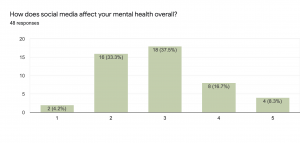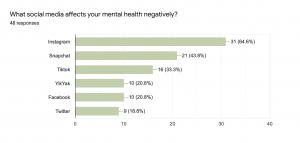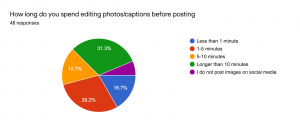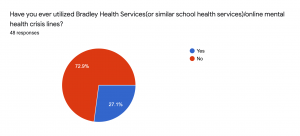Social media, according to scientific studies, is becoming linked very strongly to mental health – specifically negative mental health. In 2020, the average daily time spent on social media by U.S. users amounted to 65 minutes.
While not wholly negative in its effect, teenagers and young adults are becoming more aware of the negativity within positivity in social media. “The results of these studies show that using social media causes problems such as depression and anxiety.”
In a study performed on college students, 18 out of 48 students polled believe that social media has a strictly negative tendency, a large number when opposed to 18 out of 48 believing it has both positive and negative effects. In stark comparison, 12 out of 48 students believe that social media has a positive-leaning tendency. (see below; 1-negative, 3-neutral, 5-positive).
Comments anonymously made by students polled included: “I compare constantly”, “I would hate to have someone think negatively of me” and “I tend to not post because I don’t want to think of what others think about me.”
A main point of concern from students regarding social media is the fear of being left out. Many students participate in social media, not for themselves, but for others, and are made to feel negative when seeing themselves being left out by those that they care about.
“Social media can often make me feel left out when I see friends hanging out without me,” said Tom Nora, sophomore Advertising and Public Relations major.
On average, social media users worldwide average about 38 minutes per day on Tiktok and 35 minutes per day on Twitter, a large difference from 29 minutes per day on Instagram coming in at the smallest average.
These averages become slightly alarming in comparison to which social media sources students say affect them the most negatively. Tiktok, at the highest average minute usage, ranks middle tier on the effects on mental health. Twitter, at second highest average, ranks lowest on affecting students negatively. Instagram, with the lowest average minute usage, is ranked the highest on negative affect.
One of the largest areas of animosity on social media is in regards to photo editing. Instagram, despite being ranked as the social media that most negatively affects individuals, continues to act as the best social media source to share photos.
When polled, students responded that they spend the majority of their time editing their photos and captioning them. The most popular time allotment to students while editing and captioning photos was over 10 minutes per post.
“I tend to post stuff that I know other people would like of me, or edit them beforehand,” one anonymous student responded. Another student agreed, highlighting the unrealistic standard for women on social media.
“I tend to find myself comparing how I look to others in terms of beauty standards, and that’s where it gets to be the most impactful on my mental health,” said Nicole Pfaff, senior Sports Communication major and Journalism minor.
Negative effects from social media are not just inner concerns – social media and its boost in usage has sparked an upwards trend in cyberbullying. Statistics show that young adults that report being cyberbullied report reasonings for such harassment as due to:
- 61% appearance Media Center
- 25% academic achievement/intelligence
- 17% race
- 15% sexuality
- 15% financial status
- 11% religion
- 20% other
Despite the popular occurrence of cyberbullying on social media, a startling amount of young adults admit to not utilizing counseling services on campus to assist in recovering from these situations. Only 13 out of 48 students reported utilizing Health Services or any mental health crisis resource.
Located in the basement of Markin is the Bradley University Counseling Services. Counseling Services is there to provide students with any assistance necessary – trauma assistance, healthy coping mechanisms, and even ways to promote healthy social media usage. Bradley University’s counselor Lisa Fix-Griffin commented on what actions students should take when feeling mentally distraught regarding social media.
“Take a digital detox,” said Fix-Griffin.
“You don’t have to go cold-turkey, but make efforts to track how much time you are on social media and keep cutting it down. You will feel less stressed, depressed and able to focus better if you do.”



